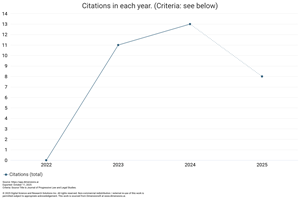Legal Review of States Financial Assistance for Political Parties According Democracy Perspective
DOI:
https://doi.org/10.59653/jplls.v3i02.1721Keywords:
Financial Assistance, Political Parties, State Budget/Regional Budget, democracyAbstract
The financial sources of political parties as stated in Article 34 paragraph (1) of Law Number 2 of 2011 concerning Political Parties are, membership fees, legally valid donations and financial assistance from the state. Financial assistance from the state through the State Budget/Regional Budget. Assistance from the state based on Article 34 paragraph (3) is given only to political parties that get seats in the legislative institution. This study aims to analyze financial assistance from the state to political parties in accordance with the principles of ideal democracy. With a normative legal approach, this study found that although regulations have regulated financial assistance to political parties, this assistance is only given to political parties that get seats in the legislative institution. Therefore, in order to realize an ideal democracy, financial assistance from the state should also be given to political parties that do not get seats in the legislative institution but participate in the general election contest, because all political parties have the same rights, obligations and functions without exception, as mandated in the laws and regulations. With this step, it is hoped that a democratic system will be realized for each political party.
Downloads
References
de la Cerda, N. (2022). Unstable Identities: The Decline of Partisanship in Contemporary Chile. Journal of Politics in Latin America, 14(1), 3–30. https://doi.org/10.1177/1866802X211069378
Elfudllatsani, B., Isharyanto, & Riwanto, A. (2019). Kajian Mengenai Kebebasan Berkumpul dan Berserikat Pasal 28E Ayat (3) Undang-Undang Dasar 1945 Melalui Organisasi Kemasyarakatan Kaitannya Dengan Teori Kedaulatan Rakyat dan Hak Asasi Manusia. Jurnal Hukum Dan Pembangunan Ekonomi, 7(1), 52. https://doi.org/10.20961/hpe.v7i1.29190
Faisal, Barid, B., & Mulyanto, D. (2018). Pendanaan Partai Politik di Indonesia: Mencari Pola Pendanaan Ideal untuk Mencegah Korupsi. Integritas, 4(1), 265–287. https://doi.org/10.32697/integritas.v4i1.248
Kurniawan, M. J. (2024). Komparasi Sistem Pendanaan Partai Politik Di Indonesia Dan Singapura. Jurnal Locus Penelitian Dan Pengabdian, 2(12), 1116–1168. https://doi.org/10.58344/locus.v2i12.2323
Manurung, T. R. E. (2015). Perkembangan Politik Hukum Pertanggungjawaban Partai Politik Dalam Pengelolaan Bantuan Keuangan Negara Pasca Reformasi. Yustisia Jurnal Hukum, 4(1), 118–128. https://doi.org/10.20961/yustisia.v4i1.8636
Paranata, A. (2025). A Systematic Literature Review of Anti-corruption Policy: A Future Research Agenda in Indonesia. Public Organization Review. https://doi.org/10.1007/s11115-025-00847-8
Saputra, M. R., & Setiadi, W. (2024). Implementation Of General Principles Of Good Government In The Organization Of The 2024 Elections. International Journal of Law and Society, 1(3), 94–112. https://doi.org/10.62951/ijls.v1i3.65
Saputro, H. C. (2024). Pj Bupati : Bantuan Keuangan Parpol Diprioritaskan Untuk Pendidikan Politik. Kabupaten Banyumas. https://www.banyumaskab.go.id/read/47629/pj-bupati-bantuan-keuangan-parpol-diprioritaskan-untuk-pendidikan-politik
Schmitter, P. C., & Karl, T. L. (1991). What Democracy Is. . . and Is Not. Journal of Democracy, 2(3), 75–88. https://doi.org/10.1353/jod.1991.0033
Sofian, M., & Fuad, F. (2024). Peran Mahkamah Konstitusi Dalam Menegakkan Prinsip Negara Hukum Untuk Mewujudkan Keadilan Sosial Berdasarkan UUD 1945. Juris Humanity: Jurnal Riset Dan Kajian Hukum Hak Asasi Manusia, 3(2), 12–23. https://doi.org/10.37631/jrkhm.v3i2.43
Syahuri, T. (2023). Teori Konstitusi (Sejarah, Teori, dan Perubahan Konstitusi). PT. Rajagrafindo.
Ufen, A. (2008). Political party and party system institutionalization in Southeast Asia: lessons for democratic consolidation in Indonesia, the Philippines and Thailand. The Pacific Review, 21(3), 327–350. https://doi.org/10.1080/09512740802134174
van Biezen, I., & ten Napel, H.-M. (Eds.). (2014). Regulating Political Parties. European Democracies in Comparative Perspective. Leiden University Press. https://doi.org/10.24415/9789087282189
Winayanti, N. K. (2016). Makna Pasal 28 Uud 1945 terhadap Kebebasan Berserikat dalam Konteks Hubungan Industrial. Jurnal Konstitusi, 8(6), 969. https://doi.org/10.31078/jk865
Wiraguna, S. A. (2024). Metode Normatif dan Empiris dalam Penelitian Hukum: Studi Eksploratif di Indonesia. Public Sphere: Jurnal Sosial Politik, Pemerintahan Dan Hukum, 3(3). https://doi.org/10.59818/jps.v3i3.1390
Downloads
Published
How to Cite
Issue
Section
License
Copyright (c) 2025 Samuel Suiq Lewerissa, Taufiqqrohman Syahuri, Irwan Triadi

This work is licensed under a Creative Commons Attribution-ShareAlike 4.0 International License.
Authors who publish with this journal agree to the following terms:
- Authors retain copyright and grant the journal right of first publication with the work simultaneously licensed under a Creative Commons Attribution-ShareAlike that allows others to share the work with an acknowledgement of the work's authorship and initial publication in this journal.
- Authors are able to enter into separate, additional contractual arrangements for the non-exclusive distribution of the journal's published version of the work (e.g., post it to an institutional repository or publish it in a book), with an acknowledgement of its initial publication in this journal.
- Authors are permitted and encouraged to post their work online (e.g., in institutional repositories or on their website) prior to and during the submission process, as it can lead to productive exchanges, as well as earlier and greater citation of published work (See The Effect of Open Access).
























